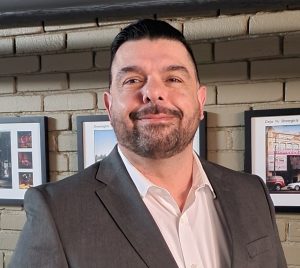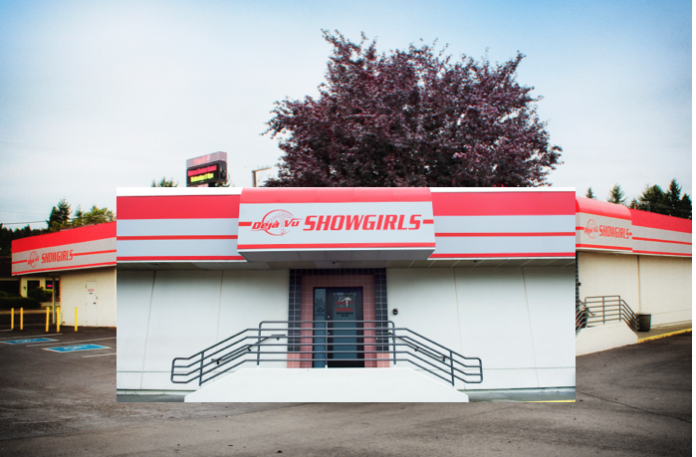The Consolidated Clubs of the Pacific Northwest
(Note: This story appears in the May 2023 issue of ED Magazine)
Long before strip clubs and their more elegant incarnations, adult nightclubs came to prominence, the predominant form of adult entertainment was adult bookstores selling 8 mm porn films and magazines (later on VHS tapes and then DVDs) and adult theaters, showing “stag films.” In the 70s, Seattle entrepreneur Roger Forbes operated about a dozen adult theaters in the Seattle area.
Then, in 1986, an opportunity arose to purchase a liquor-free, nude juice club in the Seattle suburb of Lake City and the trade name of the club. Forbes partnered with a friend from Michigan, Harry Mohney, who also owned adult bookstores and theaters. The Lake City club was the very first Déjà Vu Showgirls club. The rest is history.
In the ensuing 37 years, Consolidated Clubs has grown to ten clubs and two adult bookstores in three states, with Roger Forbes recently passing the torch to his nephew, Eric Forbes. And the Déjà Vu group of clubs now reportedly numbers over 100 worldwide.
The Life of a Road Warrior: Eric Forbes

Preventing “fires” in the club and putting them out promptly, Eric Forbes follows Uncle Roger’s lead in overseeing the success of ten Consolidated Clubs in three different states — with consistency, above all else.
C
onsolidated Clubs President Eric Forbes had quite the career path: from plastics and composites to wood to naked women. Forbes started in manufacturing engineering at Boeing. Then, wanting his own business, he migrated into the retail custom wooden furniture business where he stayed for 20 years. In 2010, Consolidated founder Roger Forbes, one of the industry’s first multi-unit operators, had a key employee retiring. Roger Forbes offered his nephew, Eric Forbes, the position. After an initial reluctance, Eric realized that nightclubs were similar to what he had been doing with custom furniture — targeted retail, just different products — and accepted the offer.
ED Magazine Legal Correspondent Larry Kaplan spoke with Eric Forbes about juggling 12 businesses in three states, and what it takes to manage the chaos and the power of sticking to the basics of the business while remaining proactive and planful.
ED: You’ve worked in three different worlds, manufacturing engineering, furniture making and operating adult nightclubs. You now oversee 10 clubs and two adult bookstores. What is your typical workweek like?
FORBES: Different worlds, but with many similarities. Business is business, and it’s shocking how many similarities there are. We have seven clubs in Washington State, two in Oregon and one in Colorado Springs.
In terms of my typical workweek, I’m like a fireman, literally all over the place checking my email every morning, looking for issues requiring immediate action and everything else. We recently had a car drive into a club’s front doors. Things like that create a chain reaction of different events because planned tasks must be rearranged when they occur.
Then I’m in the office, approving bills and answering whatever questions the bookkeepers have. And later in the day, I’m talking to the club regional managers, hearing all the latest drama and making any necessary decisions. It’s just kind of a jumble. But typically, I’m managing the chaos, while in between, trying to be proactive and planful.
ED: While constantly putting out fires, having the bandwidth to consider fire prevention must be challenging?
FORBES: You try to, but despite monitoring compliance to protocols and procedures, you can still be surprised when something that never happened before requires action. Some things are preventable, but others still pop up no matter what you do. So you just take it as some kind of learning, deal with it as it comes, because it will keep coming.
ED: Working with Roger for so long, what’s a quality you acquired or refined that has helped you improve at overseeing multiple operations?
FORBES: Nobody can ever replace Roger; he’s unique. The thing I’ve learned about him is he’s just so relentlessly single-minded. In our business, consistency is the main key to success. He had these few things that he always remained focused on; his brain never turned off, business-wise. It was always business first, and these basics were the most important thing for him. He just didn’t get distracted from them, which I appreciated. That’s a tremendous skill; it’s easy to get distracted by everything we’re dealing with.
ED: You’ve got businesses across Washington State, Oregon, and Colorado. What are some specific challenges for you of operating businesses so spread out?
FORBES: Having the time to travel to each location, spend an appropriate amount of time there, and bounce to the next location is challenging. Getting good oversight people in there to maintain the basics and protocols and keep club staff focused is critical because they tend to start setting their own agendas or going in their own directions. When you’re spread out, you need a regional manager who knows the business, can pop in and can spot things quickly. I was lucky to have inherited like-minded operators who have been doing it well for a long time. I rely on them to notice things quicker than I can.
And again, staying focused on your goal, always striving for what you want while realizing that, realistically, things don’t always go the way you think they should. For example, hiring people today is a challenge. Every business is struggling right now. We’ve always had that problem, but now it feels even worse.
ED: Your Washington State clubs are all juice? Why is that?
FORBES: Unfortunately, liquor is prohibited at adult clubs statewide. We’re actively looking at ways to change things so alcohol is allowed in the future.
ED: Tell me about your Colorado Springs club.
FORBES: Our Déjà Vu Showgirls Colorado Springs club is the only nude juice bar in that area. It’s a club where we do the basics well. We are partnering with GoBEST! on running this club. It’s been a great learning experience working directly with Jason Mohney and his team.
ED: Which of your locations presents the biggest challenges?
FORBES: Dreamgirls at Fox’s in Tacoma. It’s a club we had bought from a competitor that had been unchanged for 40 years, primarily because of a challenging distance ordinance. The city freaked out whenever they attempted any minor changes.
That club proves my uncle’s theory: stick to the basics of the business, work the plan, and you can prosper. It’s a no-frills location with a high dancer count. We can’t have VIP rooms. It’s all open, with dance couches in the back, and you can see everything. It’s just purely volume. Luckily, we have no nearby competitors other than our clubs. The competitors are at least 40 minutes away.
And more than half of our managers, including our Tacoma manager, Christina Yellowwolf, are female, which is somewhat unique in this industry. The Tacoma dancers and customers are a bit rougher, and Christina just skillfully manages through the chaos day in and day out.
Another challenging location is Dreamgirls at SoDo. It’s the top facility in the state and probably the nicest, most Vegas-like club of the whole Washington group. It’s a feast or famine location, being next to two stadiums. When the stadiums host events, it does well. When nothing’s happening, it’s a ghost town. It’s tough to have enough staff and entertainers to handle a super-busy day and then keep them when it goes dead. Being able to serve alcohol at this location would definitely help business.
Our most consistent club is Deja Vu Showgirls near Seattle’s famous Pike Place Market. It’s another basic club, but with VIP rooms and a more private dance area. Again, it has a lot of consistency, with a solid staff that’s been there for years. And it’s right in the core of Seattle, so people bar-hop.
Our other downtown club was formerly Little Darlings. We rebranded it a few years ago to create some buzz. It’s a triangular-shaped building; I painted it red and called it Devil’s Triangle to give it a darker, edgier feel than a Déjà Vu. Our GM, Julie McDowell, has increased the club’s numbers with one of the city’s highest dancer counts. Again, another example of consistency and focusing on dancer counts.
Just outside Seattle, we’ve got Dreamgirls at Rick’s, a previous competitor’s club that was shuttered for various transgressions. We took over the club and rebranded it. It was always a Rick’s, so we named it Dreamgirls at Rick’s.
On the other side of town, the Lake City Deja Vu was the very first Déjà Vu club ever. Aside from VIP rooms and a few other things, it remains basically unchanged. It’s a nude juice club; it just works, just running the basics. They had our highest dance count for the longest time. Many of those dancers have been there for ten years; they have the best day shift.
ED: Can you talk about the market in Portland? I understand there are over 100 clubs.
FORBES: Portland has tons of clubs; many are small mom-and-pop bars with a stage in the corner. Dancers are plentiful with no licensing requirements, like in Washington. In Seattle, for example, they must jump through numerous hoops, including background checks.
When I go to our Portland Rouge Club, I feel it’s the model I’d like to reproduce everywhere. When we bought the club, it hadn’t been run well. However, we almost immediately doubled their business. Andy Wallock, our Oregon Regional Manager, came from high-end liquor clubs. There weren’t many true gentlemen’s clubs in Oregon, and Andy just had a vision for a true VIP liquor club. We let him run with it, and he pulled it off. Andy focused on training servers and excellent customer service and created a program around VIP and champagne rooms, which no Portland club had, and set us apart. A few clubs have since copied us.
They’ve got the best-looking entertainers, and they’re fun. Most Portland clubs aren’t interested in minor entertainers, but we have proper protocols and manage them. They’re young, bubbly, and bring an energy level you can’t get otherwise. They’ve got their own stages; we must run them a certain way to comply with the liquor board.
When we opened in Beaverton, a Portland suburb, we copied the same general format as downtown, just a slightly hipper, more modern-looking vision. I seriously believe Portland Rouge is the single-best club in the state. And now, the Beaverton club we just built is the nicest facility in the state. It looks more Vegas-like than anything.
ED: Do you have any personal favorites among the clubs?
FORBES: The Portland Rouge is my favorite because I feel it’s the future of how the industry should be. When you go in there, it’s conducive to interaction and conversation. You can be anywhere on the full spectrum of just a couple of guys going there for a drink, enjoying the view, having a meal, spending time in the VIP room, or a mixture of those. It’s the kind of environment that feels energetic and happy. I think because of the alcohol aspect, it’s much more social. Everything right about our business is right in the Portland Rouge Club.

ED: What’s the best part of your job? What’s the most challenging part?
FORBES: The best part of my job is the variety. Just getting things done is probably the most challenging because I need more help, and there are just not enough people right now.
ED: If you had other multi-unit operators in a room, and you could share some advice, what would you tell them?
FORBES: Invest in the right people. I couldn’t do anything without good people. I couldn’t do it without people like, among others, my three Regional Managers, Caleb Steinmetz, Andy Wallock and Winter Finck, who is also the Director of Operations.
Larry Kaplan has for 22 years been the Legal Correspondent for ED Publications. In addition, Mr. Kaplan is a business broker in the sale and purchase of adult nightclubs and adult retail stores and the Executive Director of the ACE of Michigan adult nightclub state trade association. Contact Larry Kaplan: at 313-815-3311 or email larry@kaplanclubsales.com.
“I’m like a fireman, literally all over the place checking my email every morning, looking for issues requiring immediate action and everything else. We recently had a car drive into a club’s front doors. Things like that create a chain reaction of different events because planned tasks must be rearranged when they occur.”
– Eric Forbes, Consolidated Clubs President





























